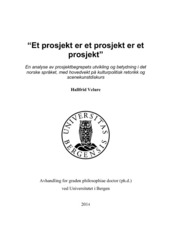| dc.description.abstract | In this dissertation I examine how the concept of project has been used in the Norwegian language, in particular in the rhetoric of cultural policy and the discourse of stage arts. As a point of departure, I postulate that the prevalence of this concept has increased in recent decades, which the dissertation confirms. The dissertation examines when this breakthrough occurred and analyses what this discursive development may mean. After a general overview of the development of the concept in the vernacular, the dissertation focuses on the evolution of the concept in the rhetoric of cultural policy in Norway and in the discourse of stage arts. The theoretical framework for the dissertation is comprised of conceptual history and speech-act theory, as well as the theories of the Danish philosopher Anders Fogh Jensen concerning the notion of the project society (Prosjektsamfunnet). In general the dissertation demonstrates that project, as a concept, as experienced a positive turn since approximately 1960, which played a decisive role in its breakthrough. From being a somewhat negatively charged concept that provoked scepticism, it became a concept charged with positive expectations. These expectations are among other things triggered by the positivity of the semantic field surrounding the concept. Project theory has been a significant contributing factor to this development following the Second World War. Another contribution came through pedagogy, which early on invested positive and desirable values such as desire, dedication and motivation in the concept. This evolution is visible in all of the dissertation’s source material, first in newspaper sources, letters and opinion pieces, and later in cultural policy documents and debates in the field of stage arts. Somewhat contrary to other cultural policy research, the dissertation demonstrates that Norwegian cultural policy hasn’t undergone a project turn in the sense that project organisation and financing have become important cultural policy tools in recent decades. Despite the fact that in the rhetoric of cultural policy, projects are to a large extent declared positive and important priorities. Instead, the dissertation argues that the breakthrough of project as a concept in the rhetoric of cultural policy should be understood in the context of the ideological difference between a conservative and a social-democratic view of the value of culture. Focusing on projects emphasises activity rather than quality. Cultural policy has consequently given less attention to important issues of infrastructure and predictability. The dissertation argues further that the use of project as a concept in the rhetoric of cultural policy has established a dichotomy between «project» and «institution». In addition to being a linguistic distinction, this dichotomy is rooted in public management and has become fundamental for understanding the cultural field in Norway. The dissertation argues that the project concept has been a constitutive force in the field of stage arts in Norway over the last 25 years. Two debates are analysed in particular. The first debate regards the development of project theatre as a concept in the early 1990s, and how it was used to highlight a marginalised milieu and an aesthetic alternative within the artistic landscape. The second debate regards the restructuring of Arts Council Norway’s grant scheme for independent stage arts in 1998, when operating grants where replaced by project grants. The dissertation demonstrates that these debates have had significant consequences in and for the field of stage arts in Norway. The use of project as a concept has played a role in determining which arguments were heard, thus influencing the development of the field. | en_US |
